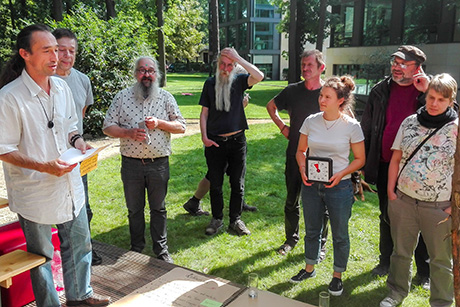When someone loses their apartment it often only is the beginning of an extensive spiral of estrangement: Other people’s respect as well as the prospect of political participation disappear until one’s own identity is ultimately called into question.
Together with “Bethel im Norden”, a department of the Bodelschwinghschen Stiftungen Bethel, and over 30 homeless people and former homeless, five students of the HPI School of Design Thinking at the Hasso Plattner Institute (HPI) have developed strategies to give this group their voice back – thus giving them the opportunity to advocate their interests together. At this year’s meeting for homeless people in Freistatt, where people from all over Europe participated, the first ideas have already been implemented.
“The group of homeless persons is very heterogeneous. Thus, it is difficult to find a common denominator, to agree on clear goals and demands”, explains Dr. Claudia Nicolai who developed the project at HPI. Estimates suggest that there are around half a million people in Germany who do not have a permanent residence. “The aim of the project was to provide homeless people with different strategies which they can use to express their own identity, to organize themselves politically and socially”, says Nicolai. For a lasting success it was essential to design and test these strategies together with homeless people in the course of the project.
“As a first step we defined “Golden Principles” to manage our interactions – honesty and tolerance are on the top of the list but accepting possible setbacks is a principle that is just as important”, describes HPI student Ines Mayan. Moreover, the project team designed “Who am I”-cards so that the homeless people can become aware of their own knowledge and skills again: “Homeless persons are under enormous pressure, psychologically and socially. Our society often mainly sees their failure, making homeless persons solely responsible and overlooking the potentials and personal stories of these people – the affected persons are suffering from these notions and it is difficult for them to use their competencies”, explaines Mayan.
Additionally, the student team developed role cards with the homeless people that can be used at assemblies. With the help of appointed moderators and keepers of the minutes problems can be discussed systematically and strategies of action can be defined. Moreover, strategies for storytelling help homeless people to bring in their own ideas into society: “At the meeting of homeless people in Freistatt one participant for example recorded everything that happened”, says Mayan. According to the student this fosters the connection among homeless persons and is the premise to implement goal-oriented projects and to become active for their own interests together.

